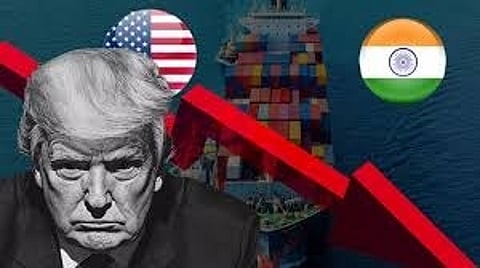

US President Donald Trump administration seems to be working on a new plan to trouble India after the nation did not bend to exorbitant tariffs on its products. The administration is said to have its eyes set on applying tariffs to IT services and foreign remote employees. Along with the already higher charges on H-1B visa petitions, Green Card holders, and temporary visa employees, the administration has been said to be looking into another avenue.
India’s Largest Export to US is- Work Force
India's largest export to America is not merchandise, but people—software developers, data scientists, IT consultants, and students. Large Indian IT companies have been at the heart of the development of the American tech industry since a long time ago, offering software development, cloud computing, and mass market business operations outsourcing. Any move to impose tariffs on the Indian IT services industry would hit jobs and the Indian economy hard.
The approach of the Trump administration is to attack key human resources, such as engineers, programmers, and students, who have been the driving force behind the American Silicon Valley and IT boom. This action indicates a larger conspiracy to restrict India's most significant export driver. The second target is to put tariffs on all outsourcing. An X social media post by political analyst Jack Posobiec that a tariff may be charged for the privilege of offering remote services to the US, just like a tariff is charged on foreign goods, has ignited the country in debate. He further added that the same policy could be applied to all sectors.
It was later shared by the same post from Peter Navarro, a Senior Counselor to the President for Trade and Manufacturing, which implies that these are proposals on the minds of influential people inside the White House.
Possible Impact of These Policies
If introduced, these policies would severely hit the global outsourcing economy. Foreign remote workers would be subjected to tariffs, which would make it more expensive for American companies to access IT and back-office services. Companies might take their contracts out, and prices would go up. The supply chain would be disrupted, and projects would be delayed. Indian companies that are dependent on the American market would experience a sharp decline in their profit margins.
India's information technology and services industry is the backbone of its economy. Hundreds of thousands of computer science and engineering graduates join the workforce every year, offering a reliable and solid pool of talent to the IT and Business Process Outsourcing (BPO) companies. Infosys, TCS, Wipro, Cognizant, and HCL are some of the biggest supporters of H-1B visas, which have enabled them to hire skilled staff in the US for years.
Digital Tariffs - Impact on US Firms
The suggestion to impose tariffs on digital services and remote work is a major change in trade policy. Whereas conventional tariffs aim at physical products, this new policy would aim at a country's intellectual and service-oriented exports. Some major analytical points are:
Imposing a "digital tariff" would not just be injurious to Indian firms but would also drive up the cost for American firms. Most US firms, ranging from small businesses to big firms, are dependent on Indian IT services to keep operational costs down and remain price competitive. Such a policy could oblige them to either raise their prices to customers or pass on the increased costs, thus prejudicing their bottom lines.
This step fits into a wider protectionist approach to "bringing jobs back home." But it ignores the fact that the world economy is integrated. Firms don't simply "outsource" to cut costs; they are able to tap a worldwide pool of talent in order to secure specialized expertise and speed innovation.
In implementing such a policy, the US could invite retaliation from India. The Indian government could in turn impose tariffs or restrictions on American products and services, thus escalating a trade war that would hurt both economies.
H-1B Visa System Targeted
Reference to H-1B visas in discussing this new tariff scheme is important. It means a multi-faceted strategy to limit the inflow of high-skilled Indian professionals into the US. By increasing the cost of temporary work and outsourcing services, the administration would be squeezing two key channels of US-India economic cooperation. It would send a chilling message to the "brain drain" and America's business access to the world's best talent.
Disrupting the Global IT Ecosystem
The global IT economy is founded upon an intricate network of outsourcing, collaborations, and cross-border human resources. Disrupting this ecosystem by a policy could result in systemic instability, project slippage, and a decrease in efficiency. To India, which has established itself as a global IT leader, this would be a direct hit at its economic model as well as its human capital.
